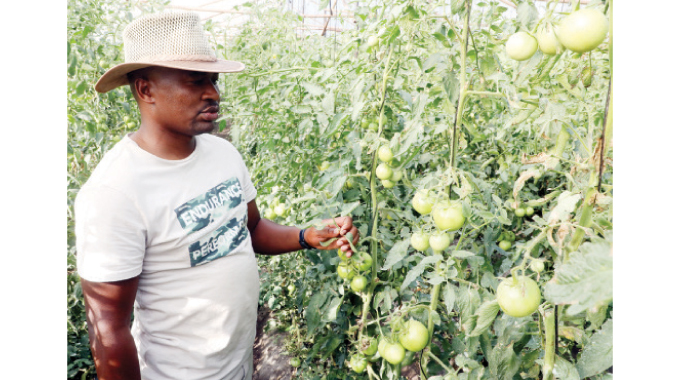The Chronicle

Mashudu Netsianda, Senior Reporter
AFTER spending about 20 years working at farms in Johannesburg, South Africa, Mr Nkosibona Satenga-Dube (39) decided to return home and put into practice the skills acquired in the neighbouring country through investing in greenhouse farming in Bulawayo.
He bought a piece of land in Ilanda suburb measuring 1,5 hectares from the Bulawayo City Council (BCC) and transformed it into a green oasis.
Like the famous King Midas popularly known in Greek mythology for his ability to turn everything he touched into gold, Mr Satenga-Dube believes whatever he touches turns green and his thriving horticulture project is testimony to that.
Through his project, Mr Satenga-Dube is contributing significantly to food security for the nation in line with the Agriculture and Food System Transformation Strategy (2020-2025) whose national thrust is to see Zimbabwe achieving a US$8,2 billion agriculture economy by 2025.
The strategy, which was launched by President Mnangagwa in August 2020, is underpinned by growing the economy and ensuring Zimbabwe grows its own food and ensures the majority of rural families move from poverty to affluence.
With no formal qualification in agriculture, Mr Satenga-Dube said it took a lot of guts for him to leave his lucrative and well-paying job in South Africa where he was a project manager to return home and venture into his own farming enterprise – Satenga Farm Produce.

Satenga Farm Produce, whose head office is situated in the Wanezi area of Godlwayo in Insiza District, Matabeleland South, supplies Bulawayo markets, local hotels and schools with fresh farm produce.
Mr Satenga-Dube also owns a vegetable shop in the city and a farm in Wanezi from where he produces bulk supplies.
“I have always loved farming from a young age. I went to South Africa where I worked in several farms and throughout my working life there, I managed to acquire the requisite knowledge, which is what I am now copying and pasting here,” he said.
“I have noticed that most farmers are actually looking for huge farms and big spaces, but I am saying you can actually do wonders even in a small piece of land as long as you apply the correct farming practices. I have managed to make a difference in such a small piece of land.”
From his small piece of land, Mr Satenga-Dube produces hybrid red, green and yellow pepper, peas, tomatoes, cucumber, red onions, beetroot, green mealies and collard greens. Mr Satenga-Dube also produces seedlings for his horticulture project.
“I don’t just do farming, but smart farming, which literally means utilising a small piece of land to produce high quality yields in huge quantities. The quality of the tomatoes that we produce at Satenga Farm can last for up to two weeks before getting bad,” he said.
 Urban farmer Mr Nkosibona Satenga-Dube
Urban farmer Mr Nkosibona Satenga-DubeMr Satenga-Dube said he specialises in trinity tomato variety, which has a long shelf life.
“While other farmers were selling their tomatoes for US$20 per crate, ours were going for US$30 and everyone was after them because of their quality and lifespan. Trinity is strong, vigorous and productive plant with an open growth habit,” he said.
A trinity tomato has a very high quality with an average mass of 140-160g and excellent quality with thick walls.
Mr Satenga-Dube believes in the organic fertilisation of soil to strike the balance between the environment and the ecosystem.
“For us to produce quality produce, we make sure that we apply all the right fertilisers and plant treatment methods. It is also important to check the quality of soil first before rushing to plant your crops. The more you inject more money the more you produce and make good profits.”
Mr Satenga-Dube said when he bought his land in January last year, it was lying idle and robbers had also turned it into a hotspot for muggings.
“Soon after buying the land, I erected a security perimeter fence and brought in vicious dogs after which I then drilled a solar powered borehole before I started farming. I invested more than US$30 00 in this project,” he said.
Mr Satenga-Dube uses a drip irrigation system to water his crops using the solar powered borehole which can pump up to 25 000 litres of water per day.
“Our motto as Satenga Farm Produce is ‘we make a difference’ and that is precisely what I have managed to do. We specialise in greenhouse farming and also construct greenhouse for farmers interested in
greenhouse farming and sharing knowledge,” he said.
Mr Satenga-Dube said his farming project has completely changed his life and has no regrets for having left his job in South Africa.
“We have several Zimbabweans in the diaspora and it is important to remind them that you can’t be a king in a foreign land. Let us come back and invest at home. Zimbabwe is a peaceful country full of business opportunities especially in farming,” he said. — @mashnets
Article Source: The Chronicle
